Deborah J. Ross's Blog, page 55
January 29, 2020
Today's Moment of Art
Published on January 29, 2020 01:00
January 27, 2020
The Tajji Diaries: A Story of Her Own
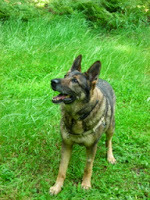 This blog was first posed in 2015. Tajji has since gone over the Rainbow Bridge, but her spirit remains with us. I read an excerpt from this story, "Four Paws To Light My Way" at FogCon last year.
This blog was first posed in 2015. Tajji has since gone over the Rainbow Bridge, but her spirit remains with us. I read an excerpt from this story, "Four Paws To Light My Way" at FogCon last year.Tajji, our elderly German Shepherd Dog, came to live with us a little over a year ago when she retired from seeing eye guide dog work. She learned new behaviors in the process of “being just a dog.” Her behavior also showed us some of the many things dogs who help the blind must learn. Some of these are responses to commands. Tajji knows “Go Right,” “Go Left,” “Easy (slow down),” and “Back,” for instance. She was also able to enter a mall (a chaotic place for a dog) with her blind person and, never having been in this place before, guide him to an elevator, escalator, or rest room.
We also noticed other behaviors from her training. She would remain lying down in the same place after we had stepped over her, touching her. Not moving would allow a blind person to remember where she is (and not trip over her, at least, not twice.) She uses a gentle nose touch as a greeting (as do most dogs; it’s polite) but also to let us know when she has come to sit beside us. She asks for attention by touching an arm, sometimes neatly inserting her nose underneath a hand. In fact, she initiates physical contact so much we suspect she was not only trained to do so, but bred for the predisposition.
All of this got my writer’s imagination started thinking about different ways dogs can be partners with humans. Years ago, I loved watching movies about Zato-ichi, a blind swordsman in Japan. He had preternatural hearing, and his ears would twitch when he heard an enemy approach, undoubtedly a theatrical device to point out to the audience what was happening internally. Since I was preparing to write a story for Sword and Sorceress 30, the idea came to me of a blind swordswoman – and putting Tajji in the story. How would they interact? What could the dog tell my character and how?

I used many of Tajji’s behaviors – nose touch, for instance, but also rate of breathing and level of muscular tension, particularly along the spine. I imagined that the dog would often make contact with the swordswoman’s leg, and she would be able to tell which way he (sorry, Tajji, I changed the sex of the dog) was facing and if he shifted orientation. She could hear the click of his nails over stone and tell not only where he was but how fast he was moving and in which direction. Finally, and most importantly, he would give her the freedom to go places not ordinarily accessible to a blind person.
Here’s a snippet from “Four Paws To Light My Way,” in which Jian deals with the skepticism of her sighted comrade:
After a time, Masou approached, halting before her. “You want dinner?”
Jian did, given the smells arising from the direction of the cooking fire. “First I want to show you something,” she said, and whistled for Dog. She heard the pad of paws over beaten earth and felt the fleeting touch of a wet nose on the back of her hand, then the pressure of a furred shoulder against her knee.
“Um,” said Masou.
Jian adjusted her sheathed sword in her sash. “Stand very still. Don’t even breathe. Now move — any direction, any number of steps. When I say Now, attack.”
He was good, she gave him that. But her ears caught the faint rustle of his pants and she felt the direction Dog’s head turned. The air told her when Masou began to move, and where. She dropped, braced herself on her hands, and swept out one foot. Hooked his ankle, jerked hard. Spun around, keeping contact with her foot, then knee and thigh as she slipped her sword from its sheath and laid the curved, razor-sharp blade on his throat. He froze. She waited a moment, then got her feet under her and stood.
“Uff! You haven’t lost your touch.” He scrambled up in a barely-audible cascade of dirt grains. “How’d you do that? Being blind and all — I mean —”
“The word does not insult me.” Jian smiled wryly as she resheathed her sword. She held out her hand and Dog came, nosing underneath her fingers so that she touched the shorter fur between his eyes, then one of the velvet ears.
“Blanket,” she said, and Dog took her there.

Published on January 27, 2020 01:00
January 24, 2020
Short Book Reviews: Math Genius and the Disappointing Sequel
Null Set, A Cas Russell Novel, by S. L. Huang (Tor)
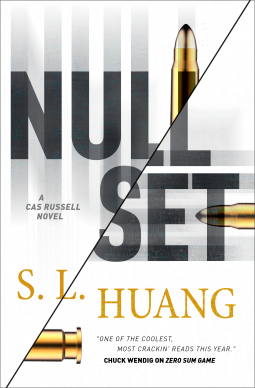
I loved S. L. Huang’s Zero Sum Game, and Cas Russell, whose superpower is her ability to make lightning-fast mathematical calculations. She works at such irregular and occasionally dubiously legal jobs as tracking down missing persons, and enjoys an uneasy but devoted friendship with psychopath, Rio. At the end of the first book, a world-wide mind-control conspiracy had been defeated after many struggles and reversals. Null Set picks up where Zero Sum Game left off, with Cas and her gang facing rising gang violence, the result of eliminating the aforementioned mind control, and she herself beset by newly resurfacing memories of a previous personality, and a telepath bent on trying to help her before whatever was done to her to give her those memories kills her. Confused? So was I, for much of the story.
Alas, Null Set feels like either a sequel that author hadn’t planned on or the flabby middle book of a series. Cas spends way too much time agonizing over this or that, tormented by fragmentary memories, unwilling to ask her devoted friends for help, and in general not accomplishing much. When she hits upon a solution to the looming gang war, she only ends up having to undo it because if people are now unable to feed off each other’s anger, they are equally immune to sharing hope. Suicide and addiction rates skyrocket. I found myself wondering what the point of it was, since we would end up right back where we started.
It felt as if the ideas and plot of a novella or maybe an even shorter novelette got stretched out into novel length. I’d loved feisty, independent Cas in the first book, but now found her indecision, unwillingness to trust anyone, and general crankiness annoying. Even her very cool mathematical genius couldn’t compensate for the loss of sympathy as a character. There’s supposed to be a third book, but I think I’ll skip it and consider Zero Sum Game as a nice, tidy stand-alone.

I loved S. L. Huang’s Zero Sum Game, and Cas Russell, whose superpower is her ability to make lightning-fast mathematical calculations. She works at such irregular and occasionally dubiously legal jobs as tracking down missing persons, and enjoys an uneasy but devoted friendship with psychopath, Rio. At the end of the first book, a world-wide mind-control conspiracy had been defeated after many struggles and reversals. Null Set picks up where Zero Sum Game left off, with Cas and her gang facing rising gang violence, the result of eliminating the aforementioned mind control, and she herself beset by newly resurfacing memories of a previous personality, and a telepath bent on trying to help her before whatever was done to her to give her those memories kills her. Confused? So was I, for much of the story.
Alas, Null Set feels like either a sequel that author hadn’t planned on or the flabby middle book of a series. Cas spends way too much time agonizing over this or that, tormented by fragmentary memories, unwilling to ask her devoted friends for help, and in general not accomplishing much. When she hits upon a solution to the looming gang war, she only ends up having to undo it because if people are now unable to feed off each other’s anger, they are equally immune to sharing hope. Suicide and addiction rates skyrocket. I found myself wondering what the point of it was, since we would end up right back where we started.
It felt as if the ideas and plot of a novella or maybe an even shorter novelette got stretched out into novel length. I’d loved feisty, independent Cas in the first book, but now found her indecision, unwillingness to trust anyone, and general crankiness annoying. Even her very cool mathematical genius couldn’t compensate for the loss of sympathy as a character. There’s supposed to be a third book, but I think I’ll skip it and consider Zero Sum Game as a nice, tidy stand-alone.

Published on January 24, 2020 01:00
January 22, 2020
Today's Moment of Art
Published on January 22, 2020 01:00
January 20, 2020
Cover reveal: Collaborators
I'm re-issuing my Lambda Literary Award Finalist novel, Collaborators, in an author's revised version, with additional maps and blog posts about writing the book. It's slated to be released March 10, 2020, from Book View Cafe, Amazon, Barnes and Noble, and other fine outfits, in print and ebook editions. Stay tuned for sneak peeks and more details.
Here's the first look at the cover, designed by Maya Kaathryn Bohnhoff:
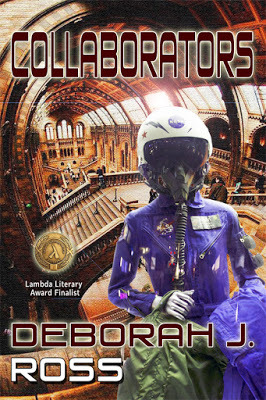

Here's the first look at the cover, designed by Maya Kaathryn Bohnhoff:


Published on January 20, 2020 01:00
January 17, 2020
Short Book Reviews: A Treasure from Lisa Goldstein
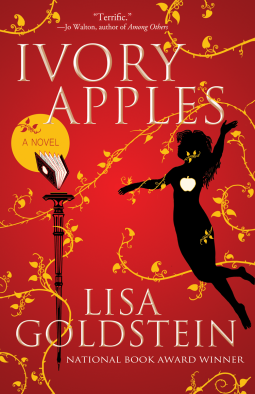 Ivory Apples, by Lisa Goldstein (Tachyon)
Ivory Apples, by Lisa Goldstein (Tachyon)Lisa Goldstein is one of the treasures of fantasy literature, with each new work a gem. Ivory Apples is, I think, her best yet. It centers around a book of the same name, one of those magical favorites that gets re-read a hundred times by obsessive fans, that helps readers weather desolate times, and that spawns fan clubs, websites, and entire conventions devoted to the story, its character, and its mysterious author. It’s also the secret in the lives of young Ivy and her three remarkable sisters. From as long as she can remember, her Great-Aunt Maude has been a recluse, an extreme introvert terrified of publicity, the family visits to her remote home never to be spoken of. For not only is Maude the author of Ivory Apples, she wrote it while partnered with an actual Muse. Soon the entire family becomes the target of Kate, manipulative and unscrupulous and single-mindedly set on getting a Muse of her own. I found myself swept up and captivated by the story in very much the same way Maude’s readers have been transformed by Ivory Apples. This book is a true treasure, worthy of multiple re-readings, a perfect holiday gift for the child in all of us.

Published on January 17, 2020 01:00
January 15, 2020
Today's Moment of Art
Published on January 15, 2020 01:00
January 13, 2020
In Troubled Times: Rumors of War
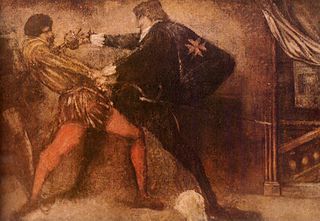 World War II cast a long shadow, and my generation was born in the aftermath. Then the shadow burgeoned into a decades-long frenzy of terror of communism. The Soviet Union was the incarnation of evil, of course, and war was ever imminent. Not just any war, though, for the atomic genie had been released from its bottle. The world came perilously close on a number of occasions. In between crises, every international twitch was scrutinized, analyzed, and dissected. Meanwhile, we kids were practicing “duck and cover,” as if hiding under a school desk could protect us from a nuclear blast.
World War II cast a long shadow, and my generation was born in the aftermath. Then the shadow burgeoned into a decades-long frenzy of terror of communism. The Soviet Union was the incarnation of evil, of course, and war was ever imminent. Not just any war, though, for the atomic genie had been released from its bottle. The world came perilously close on a number of occasions. In between crises, every international twitch was scrutinized, analyzed, and dissected. Meanwhile, we kids were practicing “duck and cover,” as if hiding under a school desk could protect us from a nuclear blast.Presidents came and presidents went, and the threat of annihilation waxed and waned but never left us. We focused on smaller wars where we had the illusion we could actually change the world. As it turned out, all those protest marches against the Viet Nam War did make a difference in the end, although at the time it didn’t seem so. In retrospect, I believe the sense of powerlessness and insignificance caused as much damage to our confidence in the future as any military threat. Which is not to say that the threat of nuclear war was not real, but rather that my generation internalized it in a way that left us vulnerable to being triggered by other events.
Humans aren’t very good at estimating the relative danger of various things. We exaggerate some risks and minimize others. Some dangers frighten us out of all proportion to the odds of them happening to us. We casually ignore other things that are much more likely to injure or kill us. The possibility of war and its affect on us, personally and nationally and globally, is no exception. We panic or we shrug or we pretend or we drive our fears into our subconscious minds, where they erupt as irrational behavior or nightmares.
For me the first strategy in deciding how to respond to news – a perceived increased threat of war– is to understand that I do get triggered. I have had frightening experiences before. When I’m discussing the news with someone not of my generation, it’s a good idea to keep that in mind. I’ve learned that I am much more likely to catastrophize when presented with certain information than in other circumstances. I remember early in this president’s tenure being suddenly terrified of a war with North Korea. That wasn’t my rational, analytical mind, calmly evaluating risk. It was my terrified child mind, remembering things I could not understand. Remembering the fears of the adults around me, and not very good at separating “that was then, this is now.”
I count myself fortunate in having been able to discuss current events with those same adults, mostly my parents. In the late 1960s, when I was in college and involved in the anti-draft, Viet Nam War protest movement, a news article sent me into a tizzy. I was sure this was going to precipitate World War III. Instead of decamping to Canada, I called my father. Born in 1907, he saw current events through the lens of personal memories two world wars. He agreed that the news was troubling but he didn’t see it as a looming disaster. His words to me were calm and rational, and what stayed with me was how helpful it was to reason things out with someone who wasn’t wigging out.
The converse is true, too. When I’m reacting strongly to news (or anything else, for that matter), I fare better when I don’t consult people who are panic-stricken on that topic.
I also fare better when I remind myself that I am not the only person in the entire planet responsible for what happens. That my thinking one way or the other, being frightened or confident, can alter the course of history. In truth, the only thing it can alter is the quality of my own life. This sort of magical thinking – that my fears can alter the future – is typical of children of a certain age, and it rears its ugly head when my own childhood fears come up. I hope -- and I believe -- that somewhere, there are other adults. This does not mean that complacency and blind trust are effective strategies for me, only that I am not alone. I can do my part (write, call my representatives, get out there on the pavement and demonstrate, and so forth) and then trust that others are doing the same.
It is as important to my mental well-being to know when to let go as it is to be inspired to take action. Passivity and helplessness are a recipe for depression. But not being able to rest, not recognizing my limits, are equally hazardous. They result in crippling overwork and neglect of my family and my self. Neither option is healthy.
And if we are to survive – and thrive – in these troubled times, with reckless military actions and myopic, arrogant leaders – then we must take excellent care of ourselves. Know our personal vulnerabilities. Talk to people who help us to think clearly and avoid those who feed our fears. Tend to our hearts and spirits. Keep all things in balance.

Published on January 13, 2020 01:00
January 10, 2020
Short Book Reviews: Saving the World from Cursed Objects
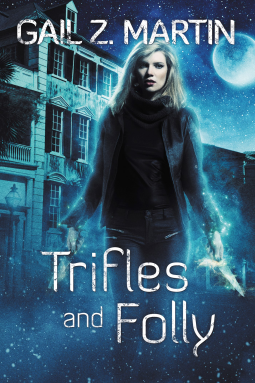 Trifles and Folly (A Deadly Curiosities Collection), by Gail Z. Martin, and Trifles and Folly 2 (SOL Publishing)
Trifles and Folly (A Deadly Curiosities Collection), by Gail Z. Martin, and Trifles and Folly 2 (SOL Publishing)“Trifles and Folly” is the name of an antique store in Charleston, South Carolina, run by Cassidy Kincaide, with a bit of help from Teague, her magically talented hacker and weaver-witch assistant, and Sorren, vampire and silent business partner. But it’s not an ordinary store, it’s a front for the collection, safeguarding, and occasionally the destruction of magically dangerous objects.
In the early stories, each featuring a different cursed or otherwise evilly charged object, Cassidy is new to the business of keeping the world safe from ghouls, ghosts, and wraiths. She’s just coming into her own as a psychometrist who can experience the history of those who owned those objects, as well as forming a network of allies, each with their own particular skill. My favorites were “Father Anne,” an Episcopal priest skilled in exorcism, and “Bo,” the ghost of Cassidy’s golden retriever, still fiercely loyal and protective.
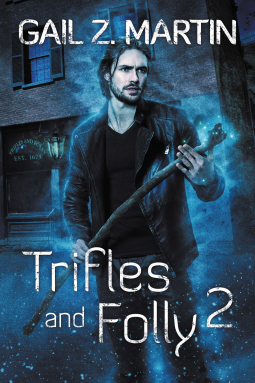 As the stories unfold, Cassidy gains in skill and experience. The bonus stories to the first volume feature Sorren in his early life, a mere century into his vampiric existence, charged after the death of his maker with continuing the work through the shop, Vanities, a precursor to Trifles and Folly. I love that Sorren isn’t infallible, and that even his vampiric strength can be overcome with sufficiently ancient and evil sorcery. Like Cassidy, he finds allies, both human and supernatural. His shortcomings and limitations give him add to him being a sympathetic character.
As the stories unfold, Cassidy gains in skill and experience. The bonus stories to the first volume feature Sorren in his early life, a mere century into his vampiric existence, charged after the death of his maker with continuing the work through the shop, Vanities, a precursor to Trifles and Folly. I love that Sorren isn’t infallible, and that even his vampiric strength can be overcome with sufficiently ancient and evil sorcery. Like Cassidy, he finds allies, both human and supernatural. His shortcomings and limitations give him add to him being a sympathetic character.Although the entries in the first volume are all short stories, those in the second include longer novellas. The “Deadly Curiosities” novel series offers even more complex delights for readers like me who find the characters and their challenges enchanting in the best possible way.

Published on January 10, 2020 01:00
January 8, 2020
Today's Moment of Maxfield Parish
Published on January 08, 2020 01:00











